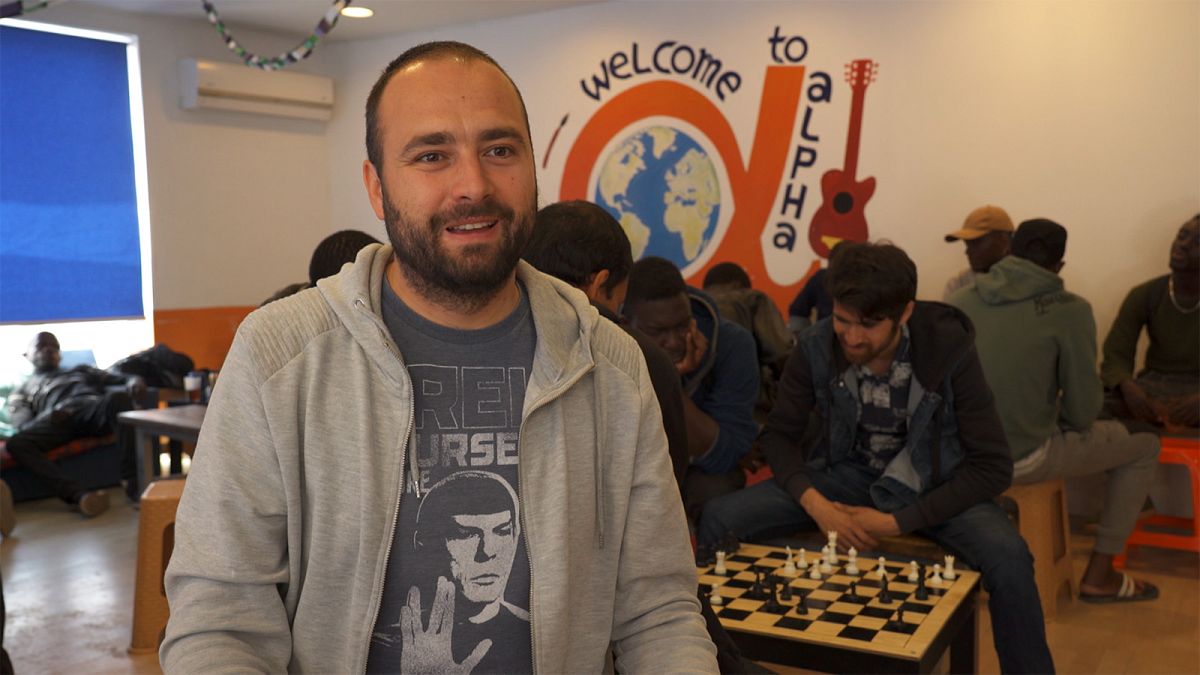Bogdan Andrei is the head of Samos Volunteers, one of the few NGOs helping the many migrants who are stranded in Samos. He speaks to euronews reporter Valérie Gauriat about the ordeal they are going through, and how the european immigration policies are failing to improve the situation.
Bogdan Andrei is the head of Samos Volunteers, one of the few NGOs helping the many migrants who are stranded in Samos, in one of the so-called "hotspots" set in several of the the greek islands of the North Agean sea.
He speaks to euronews reporter Valérie Gauriat about the ordeal they are going through, and how the european immigration policies are failing to improve the situation.
Valérie Gauriat: "It doesn't look like the situation has improved in the past years?"
Bogdan Andrei:
"The situation hasn't improved in any way.
Right now there's over 3300 refugees on Samos. The capacity of the camp is 650. The delays on the asylum procedures are extremely long. We've seen recently people getting interview days for 2022, even someone in 2023, for their appeal. Which is incredibly long. Having people waiting for such a long period of time, without any clear information, without knowing what's going to happen with them , without having a proper integration process in place, or having the possibility to work and provide for themselves, really affects people. Especially their mental health, and this causes a lot of distress.
It doesn't look like things are going to change any time soon. Because the system is broken right now. If we look at the EU-Turkey deal, it has never properly worked. People's cases were supposed to be treated very quickly. The hotspots were supposed to be a "triage" point, where people that are supposed to get asylum are allowed to stay, and the others that are rejected for asylum should be quickly returned to Turkey or to their home country. Right now what is happening is that people are waiting for months or years for their asylum procedure to be completed. And without knowing what's going to happen.
Even if they get a rejection, they are still staying here for a very long period of time with no prospect whatsoever.
Hosted inhumane conditions, people are kept in a limbo
The asylum service doesn't have enough capacity to deal with it. Maybe there's also not enough willingness to deal with it. There are people saying that having hot spots in very bad conditions will prevent more people from coming. It's absurd even to think that someone is considering this as a way of preventing people coming. That is not true. People are continuously coming, and are hosted inhumane conditions. This is not acceptable. It's inhumane.
Let's say people are transferred to better living conditions. Again they will have to wait for 2 years, 3 years maybe, for their asylum claim to be solutioned, and will be kept in a limbo, where they don't know whats going to happen to them.
They cannot start rebuilding their lives. They are just waiting and waiting and waiting.
People are just parked somewhere waiting for their asylum claim to be solutioned and this very long process definitely affects them. It affects their mental health. It's going to be much harder for them to integrate in the society after this period of isolation. No one knows how things will move.
Greece also has stated that their capacity of integration is 12000 people per year. There's much more people arriving . Also the capacity of dealing with asylum claims is about 30000 per year. which is more or less half of the number of the people that arrive per year. So theres a huge backlog and it doesn't seem that enough resources are put in to deal efficiently with this problem.
Valérie Gauriat: "So where is the money going?
Bogdan Andrei:
"Right now the policy of the European Union is to send the big chunk of money to the Greek government. This has changed from 2016 when a lot of money was sent directly to big organisations or NGOs. But now the money is funneled through the Greek government, which does not reach the beneficiaries. If we look at the camp in Samos right now, yes there is a lot of money sent by the EU to the Greek government. But the money does not reach the people on the ground.
It's not acceptable that someone has to live in a tent for 8 months, a year or a year and a half. With no sanitation, no protection, no proper food. Looking at the most vulnerable, like children or babies or pregnant women. They have to live in a tent for a long period of time. There is a lot of money sent but the money does not reach the ground. So a lot of the initiatives, like our group, work only on private donations. We don't get government money. Most of the groups providing services here, work with private donations. So where is the money ?
The money is in the central government, in the bureaucratic system. It seems like the process of getting from the central government to the people on the ground is sometimes unsurmountable. "
